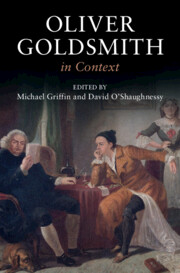Book contents
- Oliver Goldsmith in Context
- Oliver Goldsmith in Context
- Copyright page
- Dedication
- Contents
- Illustrations
- Notes on Contributors
- Preface
- Chronology
- Abbreviations
- Part I Life and Career
- Part II Social, Cultural, and Intellectual Contexts
- Part III Literary Contexts
- Chapter 19 Fiction
- Chapter 20 Theatre
- Chapter 21 Pastoral Poetry
- Chapter 22 Prospect Poetry
- Chapter 23 Periodicals and Literary Reviewing
- Chapter 24 History Writing
- Chapter 25 Authorship
- Chapter 26 Orientalism
- Chapter 27 Satire and Sentiment
- Chapter 28 The Sister Arts
- Chapter 29 Music and Song
- Chapter 30 France and French Writing
- Part IV Critical Fortunes and Afterlives
- Further Reading
- Index
Chapter 20 - Theatre
from Part III - Literary Contexts
Published online by Cambridge University Press: 28 November 2024
- Oliver Goldsmith in Context
- Oliver Goldsmith in Context
- Copyright page
- Dedication
- Contents
- Illustrations
- Notes on Contributors
- Preface
- Chronology
- Abbreviations
- Part I Life and Career
- Part II Social, Cultural, and Intellectual Contexts
- Part III Literary Contexts
- Chapter 19 Fiction
- Chapter 20 Theatre
- Chapter 21 Pastoral Poetry
- Chapter 22 Prospect Poetry
- Chapter 23 Periodicals and Literary Reviewing
- Chapter 24 History Writing
- Chapter 25 Authorship
- Chapter 26 Orientalism
- Chapter 27 Satire and Sentiment
- Chapter 28 The Sister Arts
- Chapter 29 Music and Song
- Chapter 30 France and French Writing
- Part IV Critical Fortunes and Afterlives
- Further Reading
- Index
Summary
This chapter explores contexts for Goldsmith’s career as a playwright, such as competition between Covent Garden and Drury Lane theatres that were factors in the moderate success of The Good Natur’d Man in 1768 and the surprise runaway hit that was She Stoops to Conquer five years later. These plays are considered in the light of how the Seven Years’ War, which greatly expanded the British empire, challenged conceptions of Britishness at home and abroad. Goldsmith’s comedies respond to the perceived effeminization of culture in the 1770s, associated with the possibility corrupting influence of luxury and commerce as a result of imperial expansion. This influence was manifested in new kinds of fashionable sociability such as the masquerade with its uppity women, and the phenomenon of the male ‘macaroni’. Goldsmith also tests the conventions of the comedy of manners in how he deploys minor characters in The Good Natur’d Man and the cross-class appeal of Tony Lumpkin in She Stoops to Conquer.
Keywords
- Type
- Chapter
- Information
- Oliver Goldsmith in Context , pp. 169 - 177Publisher: Cambridge University PressPrint publication year: 2024

